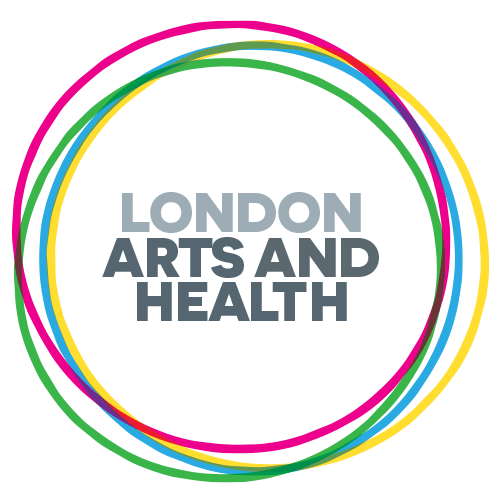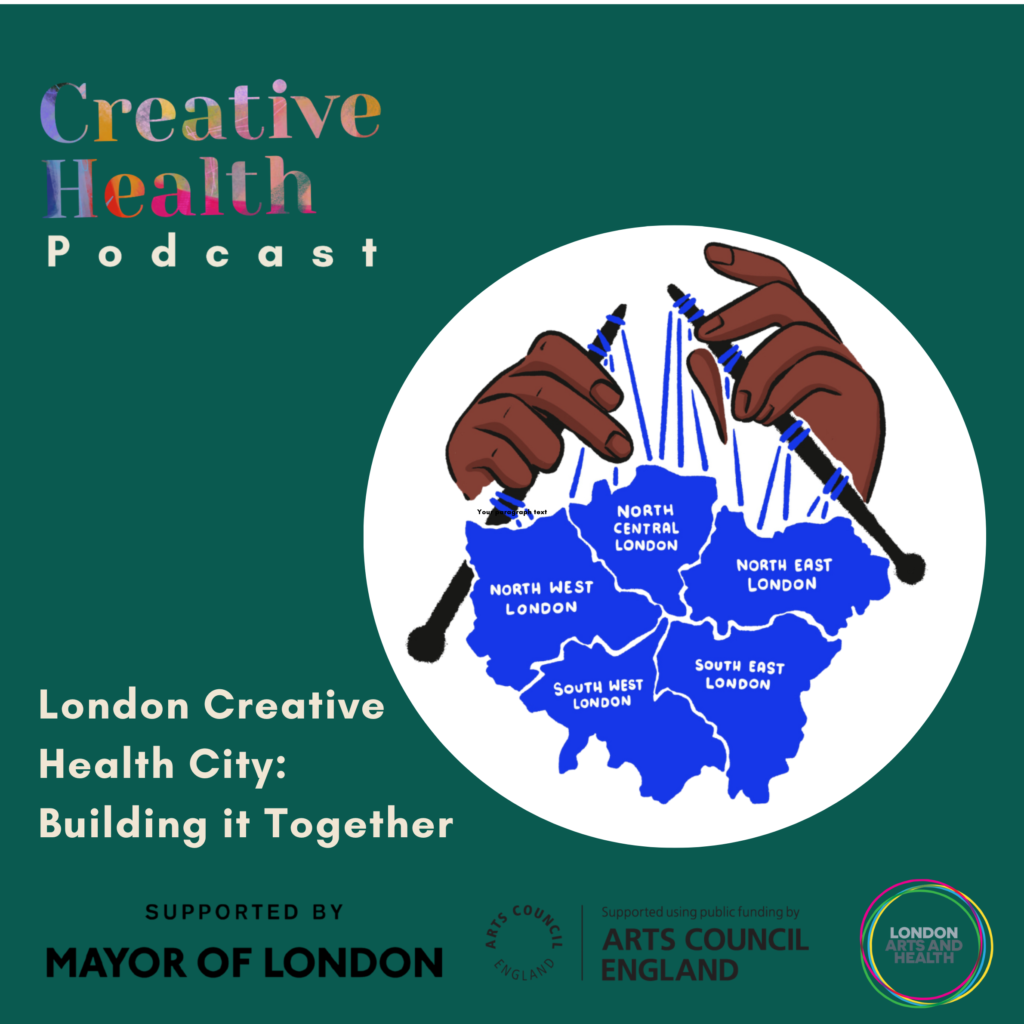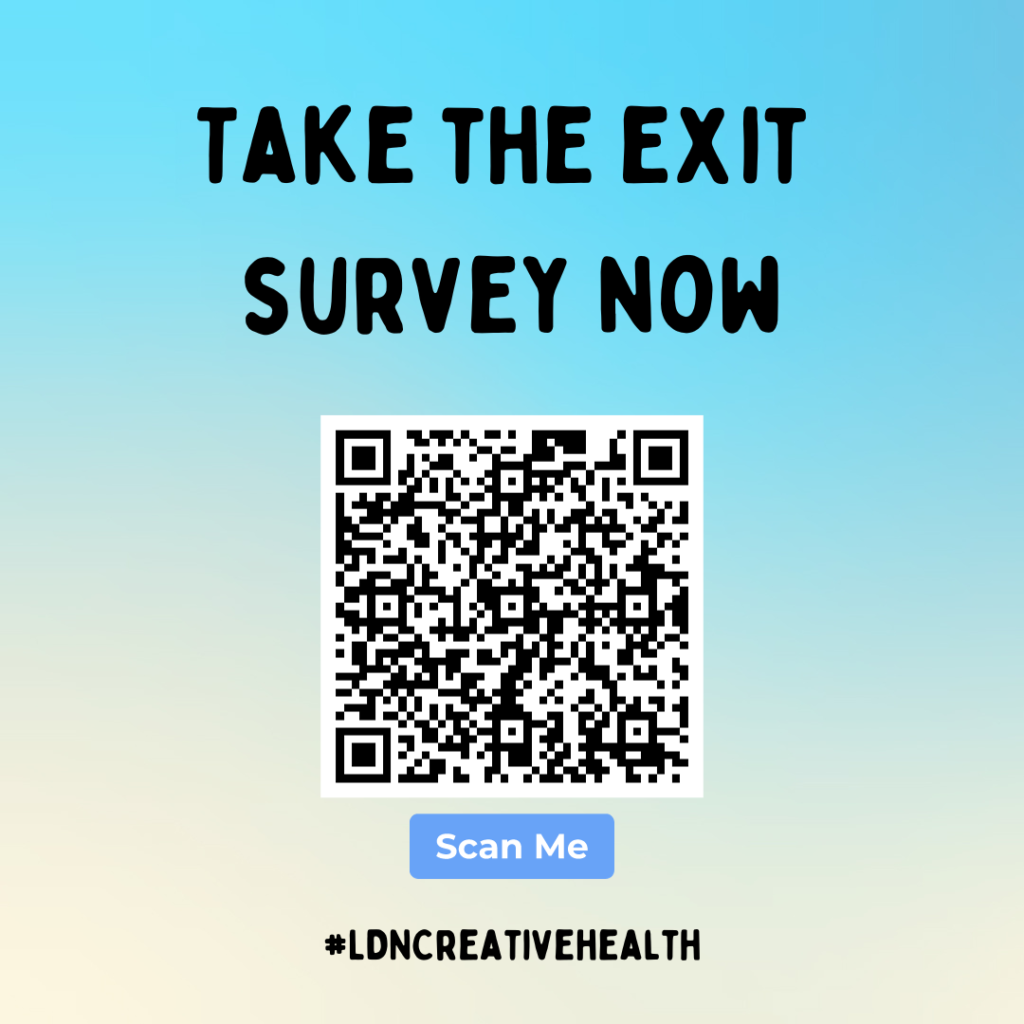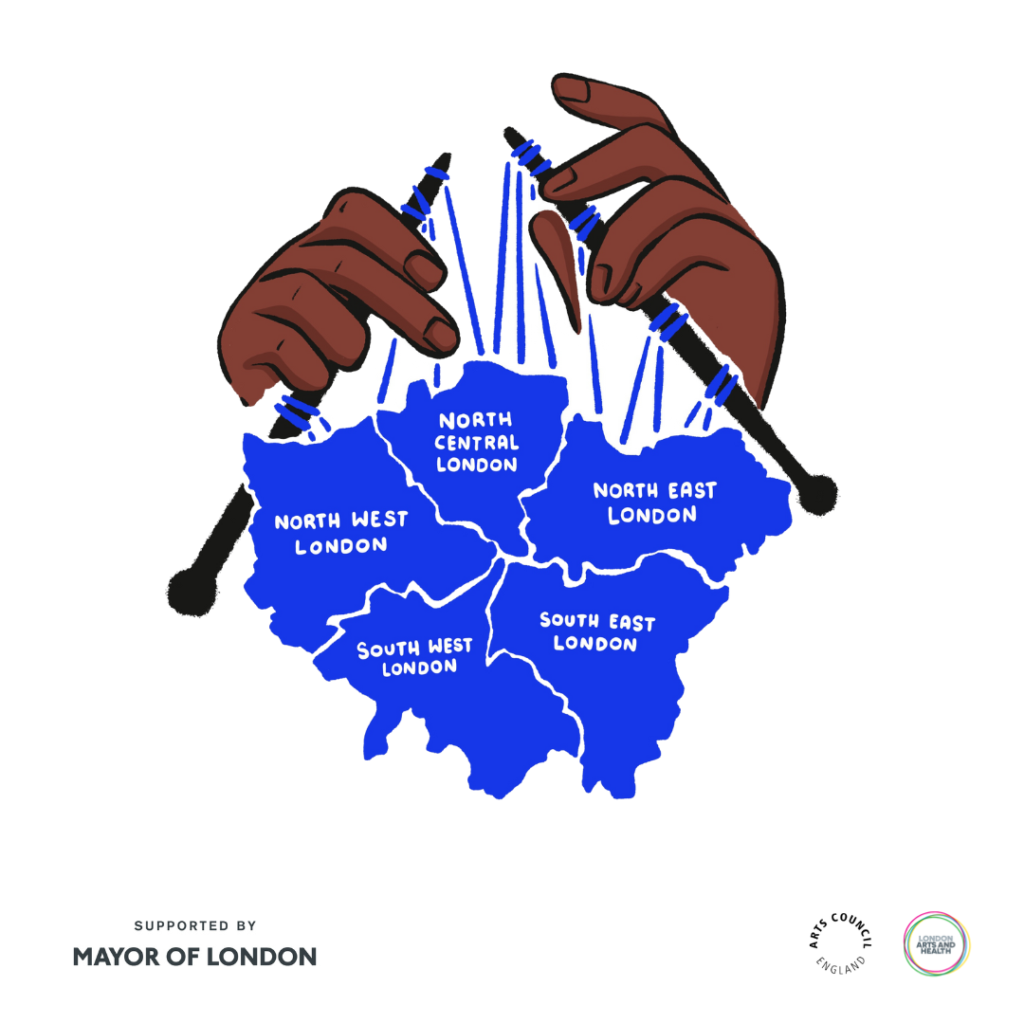
London Creative Health City: Building It Together
London’s Creative Health Sector met on the 27th November 2023 at Battersea Arts Centre and also online via Zoom.
Please sign up to our mailing list here and we will keep you updated on all the materials that come out of the event, and any further information on the Creative Health City.
Listen to Laura Bailey at the Creative Health Podcast’s special episode here.
You can also read our short reflection on the day here. Read the poem, co-written by attendees on the day and curated by Arji Manuelpillai below.
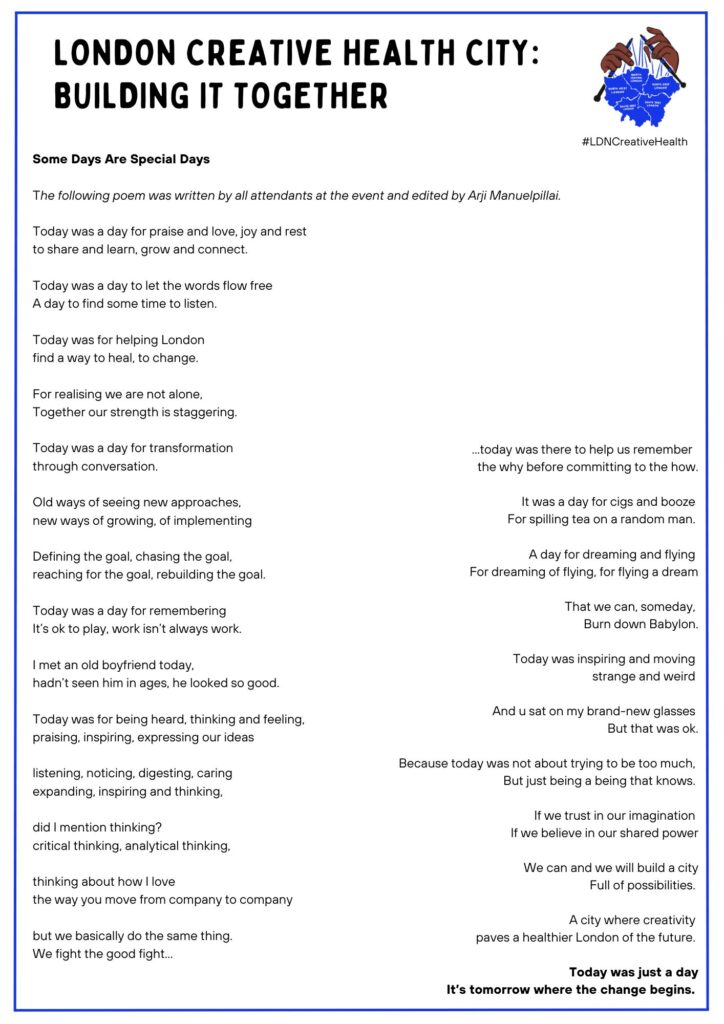
Culture has a significant impact on people’s physical and mental health and wellbeing. Through a multitude of organisations, practitioners, artists, creative health workers, social prescribers, allied health professionals, ICS systems and more we see health and culture working together to address health needs across the UK’s capital city.
However, for too many Londoners these activities are out of reach.
On the 27th November we invited everyone interested in the intersections of health and culture to come together to take part in a day of exchange and reflection, boundary pushing and action planning. Together, we imagined London as a Creative Health capital city, laying the building blocks to see it become reality.
An initiative developed and funded by the Mayor of London and Arts Council England, delivered in partnership with London Arts and Health.
DID YOU ATTEND? TAKE OUR EXIT SURVEY
Did you attend either in-person at Battersea Arts Centre or online via Zoom?
Take our event survey now, simply click here or scan the QR code to access the short evaluation form.
EVENT AGENDA
The full event agenda for online and in-person is now available to view here.
The in-person event will start at 10:30 am and your host for the day is Arji Manuelpillai who is a poet, performer and creative facilitator. If you are attending our Zoom event it will start at 11am and your online hosts will be Rebecca Manson-Jones and Monique Jackson from Spare Tyre Theatre.
If you are attending in-person at Battersea Arts Centre there will be a short address from:
- Prof. Kevin Fenton: Regional Director of Public Health for NHS London.
- Justine Simons OBE: Deputy Mayor for Culture and the Creative Industries in London.
- Tarek Iskander: Artistic Director and CEO at Battersea Arts Centre.
The room will be held in a very light touch way, meaning that attendees will be encouraged to move to what interests them most, to meet and network with other colleagues, to generate ideas that build the creative health city movement in London and also to have some time to rest, recuperate and feel refreshed.
As well as the curated conversations there will be open slots across the day where you, the audience will be encouraged to suggest your own conversation starters. We really encourage you to take part, and can’t wait to hear and see everyone’s ideas in the space.
In-person artistic interventions available across the day will include:
- Taking Care of Ourselves with Daniel Regan from Arts & Health Hub.
- Zine-Making for a Creatively Healthy City with The Road Zine.
- Craft Forward: Assembling Blankets for London.
- ‘Arji’s Poetry Corner’ Creative Health City Spoken Word.
- ‘Mapping the building blocks’: Identifying what’s happening in your ICS region hosted by London Arts and Health.
Closing remarks come from:
- Hollie Smith-Charles: Director, Creative Health & Change, Arts Council England.
We have some pre-reads that might support your understanding of both the in-person and online event including:
- Safer space boundaries for the Creative Health City
- The four principles of Open Space Technology and the law of two feet for Open Space Technology
- Acronyms relevant to the Creative Health City
ABOUT THIS EVENT
The day will be organised around a series of curated and spontaneous conversations – decided by attendees.
There will be a variety of creative and reflective activities tailored to the creative health sector, including ideas to help you connect, reflect and take care of yourself in the context of your practice and work.
A quiet space will be available, there will be materials to aid creative conversations and networking, along with a vegan and nut-free free lunch, tea, coffee and snacks to keep you sustained. This will be first come first served and we will do our best to ensure everyone is accommodated. There will be a long lunch and there are plenty of places to grab a bite in and around Battersea Arts Centre if you are attending in-person.
ABOUT THE CONVERSATION STARTERS
The first half of the event will consist of a series of curated conversations decided via a callout. We will borrow processes from Open Space Technology to facilitate the conversations in a dynamic and inclusive way, giving space for everyone to contribute to the day’s agenda.
What do we mean by ‘conversations’? We are using this term to describe creative and reflective ways in which to engage audience members at this event. Conversations can be creative (show, don’t tell) and do not need to be formally structured (for example, the conversation host might come with a question and attendees will contribute). In person on the day at BAC and online, there will be a variety of different ways to get involved – on your terms.
As well as pre-programmed conversations, attendees will have the opportunity to pitch and host a conversation on the day relating to London Creative Health City: Building It Together.
Some examples could be:
-
- How people, organisations and healthcare providers in my neighbourhood are building a creative health zone;
- Incorporating culture and creativity across anchor institutions mobilising to support health and wellbeing of Londoners;
- How culture addresses health inequities around social justice in my borough/ICS region;
- The Creative Health Quality Framework: how it might work to aide the design of creative health projects;
- Training the next generation of creative health practitioners – my experience of what’s working and what’s missing;
- I am a trauma-informed creative health practitioner and I want to share the 5 principles behind my work;
- Cultural Social Prescribing: how can we reach marginalised communities in London;
- How can our networks build the Creative Health City? A discussion.
- If I had XX money to support cross sector collaboration in my London borough what would I do?
MORE INFORMATION
Accessibility
Please read our accessibility policy which details all of our provision for the day.
- If you need extra assistance beyond our this, please tell us what you need when you register. If you have any queries, you can also contact us info@londonartsandhealth.org.uk
- Please read Battersea Arts Centre’s Access policy for more information on the venue.
Covid Policy
- If you feel unwell, please do not attend in-person on the day. We also have a Zoom space and can reallocate your ticket to this online space if you are unable to attend in person.
- We ask all attendees to complete a lateral flow test at their discretion no more than 24 hours prior to the event.
- We will provide masks, hand sanitizer and Clinell Wipes for keeping attendees safe.
- Read our full approach to Covid here.
Catering
- A vegan and nut free lunch will be provided. Please tell us when you apply for your ticket if you have any food allergies beyond this, such as a gluten intolerance.
- We have tried to provide everyone with food, but please note there are plenty of places in and around Battersea Arts Centre if you want to travel further afield in the lunch break.
Demographic Data
- You can opt in to share your basic details with other attendees, if you would like to keep in touch with each other.
- We will therefore ask you some basic questions when booking your ticket such as your job, sector and website and email address.
- This is all optional, and we will ask your permission – and you do not have to do this.
- Upon completion of your ticket booking we will direct you to a short, optional, demographic questionnaire for our own monitoring purposes.
Capturing the event
- We will also be filming and taking photos of the day to try and capture some of the conversations happening. Please speak to the team on the ground if you do not wish to be included.
- Creative Health is a programme of work that uses creative practice to support people with physical and mental ill health;
- Creative Health embraces visual, performance arts, film, literature, music, crafts, gardening, natural and heritage and digital arts;
- Activities might take place at a concert hall, gallery, library, faith space, museum, theatre, historic building or park. Or it might happen in a health or social care setting, local community space or at home.
And what is the Creative Health City?
Over a period of six months City Hall alongside Arts Council England and London Arts and Health have explored what a Creative Health City might look like for Londoners, through a series of conversations and policy design sprints. The process generated key characteristics of a Creative Health City: London.
These currently stand as:
10 Plus 1: A Creative Health City is where:
- Every Londoner at all life stages are offered opportunities to support their mental and physical health through cultural activities brought through connections with local and national cultural sector organisations and creative practitioners.
- We advocate for the benefits of health creation to support Londoners to thrive at whatever age and wherever they live – working together to address health inequity across the capital.
- We take a systems approach. Working in partnership is the norm with close relationships between health, mental health, education, culture and public health professionals and championed by senior leaders across these sectors.
- The culture sector and health sector share a common understanding of the benefits of culture and are confident to commission and signpost.
- There’s a shared understanding of the quality of delivery of Creative Health activities and the culture sector strives for excellence of experience and impact.
- A common quality framework for the evaluation and evidencing of the benefits of culture between culture and health/social care systems.
- Creative Practitioners are supported to deliver work through professional development, self-care support and the right to a fair living wage.
- Funders and commissioners acknowledge the full costs of delivery of excellence in Creative Health which includes support for self-care, planning and evaluation.
- Lived experience is at the heart of design, delivery and evaluation as the norm rather than the exception.
- We celebrate and support innovation, creativity and new approaches to ensuring every Londoner thrives through culture.
- We explore sustainable funding mechanisms, including: Bradford’s Left Shift – 1% of health and care budget to the VCSE; community chests; and participatory budgeting to support neighbourhood health creation through creative health.
There will be a number of pre-programmed conversations that will take place on the day both in-person and online. Alongside this, attendees in both spaces will be able to suggest their own conversations on the day.
Key ingredients of the conversations:
- Show, don’t tell;
- conversations are convened with purpose, allowing attendees to feel: engaged, informed, reflective and able to ask questions and exchange;
- Conversations are held for up to one hour long, you might finish earlier, that is no problem;
- Conversations typically run for up to 20 people, more than 20 makes it difficult for everyone to have the opportunity to share amongst the group; Equally the event format gives people the freedom to choose which sessions they attend, so we can’t predict how many people will attend on the day, so make sure your conversation can work for varying numbers of people!
- One person within your conversation will be put forward as dedicated note-taker to record key parts of the conversation, so you can simply focus on facilitating and holding the space for different voices;
- The materials available to you will be very lo-fi in person. In-person we can’t guarantee a screen to display slides, it will be you, chairs and a keen audience, so keeping it simple is key!
- On Zoom you can utilise share screen, you could play music through audio sharing or you could ask your online attendees to write or draw something and share on camera.
- This is not a marketplace to sell your project (even though we are sure it’s fantastic!)
- Effective questions for open space sessions often have high-levels of complexity, diversity, conflict and urgency;
- We ask that ideas are understandable to everyone, consider that we are all coming from different fields, so it’s best to avoid jargon!
Example formats of conversations:
- Show and tell
How my organisation approached a multi-sector creative health partnership, what have been our learnings and how are we moving forward?
- My big question
What does the culture sector need to understand about integrated care systems to collaborate and work together?
- Learn how to do X
I am a trauma-informed creative health practitioner and I want to share the 5 principles behind this work.
- Fishbowl conversation
How do the spaces and contexts we deliver our practice and programmes marginalise Londoner’s – how can we be more inclusive?
- Lightning talk on hot topic (5 mins followed by whole group discussions)
If I had XX money to support cross-sector collaboration in my borough what would I do?
We are borrowing ideas from principles such as Open Space Technology but making it work for London, and our sector. Open Space Technology (OST) is a methodology of running large group meetings or events around a central topic where participants create the agenda themselves. The process is designed to be highly participatory, inclusive and collaborative.
What is open space technology?
For the delivery of the Creative Healthy City event in-person and online, we are borrowing ideas from open space technology principles, therefore, we wanted to provide a brief overview of what this means in practice, so you are prepared and ready for the day ahead!
More detail about the in-person event
Wayfinding on the day at Battersea Arts Centre:
Sessions will be demarcated with tube station signs, which align with their location in the venue, North, South, East and West.
Pre-arrival checklist:
- Familiarise yourself with the programme, what sessions appeal to you?
- Think about your own discussion topics that you might like to facilitate in the afternoon
- We have open slots available 2-3pm and 3:20-4:20pm for all attendees to propose sessions
- You can see guidance on conversation formats on this page: https://londonartsandhealth.org.uk/london-creative-health-city-building-it-together/#1694781871233-58f97dbc-9228
Arrival and session 1:
- At check-in, you can decide which session you would like to attend in the first slot, 11:20-12:20. Staff and volunteers will signpost you to the location of the session in the space.
Session spaces will be initially allocated on a first come first served basis, with a maximum of 20 people per session.
- Following the opening keynotes, the room will prepare for the first set of discussions. This is your opportunity to move and change to another session, join one of the artistic workshops, catch up with a colleague, the choice is yours!
- Once the session starts you decide how to participate. Session facilitators are expected to create a space that allows people across the group to speak and participate, in a co-produced conversation.
- If the session is not for you, this is the time to exercise the ‘Two feet law’, which says that If a session is not serving you or your interests, you are welcome to leave to join another session, get some air etc.
Community board: Proposing Sessions
- The community board is the nucleus of the event, this is where attendees can propose session ideas for the 2-3pm and 3:20-4:20pm slots.
- The board will be open all day from arrival, and held by a staff member, who can be there to listen and write down your brief discussion proposals , help pull together similar themes of conversation amongst attendees
- Once we have details of your session, we will allocate you a space in the room to host the conversation.
- When the event resumes after the lunch break, the host will call out the session titles and locations.
- If hosting a larger session is not for you, you can also post a request for a 1-1 conversation, that might happen at the event, or is scheduled at a later date.
Hosting a session:
- Materials for your session will be available on a dedicated table, including different size paper, pens, pencils, post-it notes.
- Note-taking: during your session we ask you to nominate a note-taker, this might be one of our event volunteers or another conversation attendee.
- A simple template will be provided which asks for 5 key session take-aways.
More detail about the online event
- 11:00am Online attendees join the Zoom session, where the facilitator introduces the event online structure.
- 11:20-12:20 pm Three curated sessions take place during session 1, attendees can join any session via breakout rooms, and can move between sessions.
- 12:20-12:30 pm Conversation proposals gathered for session 2, group leaves for break.
- 14:00 – 15:00 pm Facilitator returns to zoom, welcomes any new attendees, and guides people to choose a breakout session with new discussion topics.
- 15:00 pm Facilitator sums up session and session resources, zoom finishes.
If you have additional questions please email info@londonartsandhealth.org.uk.
Why is this opportunity only open to people based in London?
The event is about the future of London as a Creative Health City, and prioritises those living and working in London. It is funded by the Mayor of London and Arts Council England’s London managed funds.
Who will select the conversations for the event?
An Advisory and Accountability Group external to the three partner organisations will make the final selection of conversations and is feeding into the format of the day.
The aim of the group is to act as an advisory panel to London Arts and Health (LAH), the Greater London Authority (GLA) and Arts Council England (ACE) in the creation of the event – London Creative Health City: Building It Together. This event, targeting professionals in the arts and health sector, aims to foster inclusivity while addressing existing power inequities within the sector. The Advisory and Accountability Group will provide guidance on social justice models and social models of disability to ensure that the event design promotes inclusivity and actively challenges these inequities.
The panel includes:
- Gay Palmer, is the Social Prescriber Link Worker Team Lead South Southwark Primary Care Network and Trustee for the National Academy of Social Prescribing.
- Cedric Whilby is one of the leads for Southwark Culture Health and Wellbeing Partnership (SCHWeP) and a Community Southwark trustee.
- Rebecca Manson Jones has lived experience of long-Covid and is the Artistic Director / Joint CEO of Spare Tyre Theatre.
- Mairéad Ruane has lived experience of OCD and is the Lived Experience Programme Co-ordinator at Rosetta Life.
You can view the full event agenda for both in-person at Battersea Arts Centre and online, here.
- Safer space boundaries for the Creative Health City
- The four principles of Open Space Technology and the law of two feet for Open Space Technology
- Acronyms relevant to the Creative Health City
- You can view our accessibility and Covid-19 policy document on Google docs here.
- You can view the volunteer pack on Google docs here.
- You can apply to be a volunteer on Google Forms here.
- You can tell us some demographic information to help with making this event as equitable as possible, on Jotform here.
Please read our accessibility policy which details all of our provision for the day.
Accessibility provision which has been planned for the in-person conference includes:
- Venue has step free access;
- Suggested Covid Protocol to keep attendees safe;
- Dedicated quiet space to use throughout the conference;
- Name tags for delegates;
- Financial bursaries will be available to support some delegates to be able to attend the conference;
- Live captioning for keynote speeches / panels;
- Battersea Arts Centre can get cold: we advise wrapping up warm!
For the Zoom option captioning will be available, we will ask speakers to speak loudly and clearly and use things like image description and enabling captioning.
Please contact info@londonartsandhealth.org.uk for more guidance.
